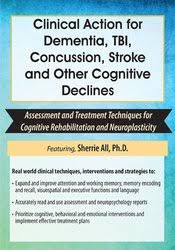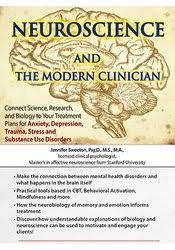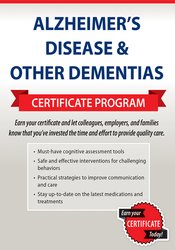🌟 New Year Offer 🌟
Celebrate 2025 with 30% OFF on all products! Use code: NEWYEAR2025. Hurry, offer ends soon!
The treatment landscape for Brain-related cognitive interventions and dementia are rapidly changing. It is difficult to stay up-to-date on the best treatments and those that have failed.-hyped.
Sherrie All – Clinical Action for Dementia

THE FRAMEWORK AND SCIENCE OF COGNITIVE REHABILITATION: NOT ALL BRAIN GAMES ARE REHABILITATION
- The latest research on brain plasticity
- The brain regions and functions that are related
- Compensatory or restorative strategies vs. compensatory
- Cognitive stimulation, cognitive Training and Cognitive Rehabilitation
ASSESSMENT APPROACHES DURING COGNITIVE DESLINE
- What the MOCA & SLUMS are telling and not telling
- When to refer for A complete neuropsychological assessment
- Get the most out of assessment results, including reports on neuropsychology
- Static (TBI / stroke) vs. progressive decline (Alzheimer’s disease): Set and maintain realistic treatment goals
- Careful not to “over-pathologize” concussions – Know the difference between TBI and CTE.
- Measurement of personality and mood
INTERVENTION APPROACHES FOR BARRIERS TO REHABILITATION: MOOD, MOTIVATION & ANXIETY
- Motivational interviewing for engagement and brain health interventions
- To improve cognition, treat anxiety and false beliefs
- Counseling the brain-impaired patient to adjust to illness and grief
THE COGNITIVE DECLINE BOX: REAL WORLD TREATMENT STATEGIES FOR EVERY COGNITIVE DOMAIN
ATTENTION & WORKING MEMORY
- Attention impairment: The neural bases
- As a way of improving metacognition, clients can be helped to understand working memory capacity.
- Improve attention and reduce errors by following the DIRECT model and using PEAS & LEAP
- “Focused drilling” To increase working memory capacity and generalize to other outcomes
- Mindfulness training is a way to help clients focus and shape their attention.
MEMORY: PROSPECTIVE, ENCODING & RECALL
- The neural bases of memory impairment
- Frontiers in Alzheimer’s disease management
- Tailor memory training interventions to level of severity & motivation
- Effective use calendars and other external memory tools for Effective daily functioning
- Visualization, linking, and chunking are all ways to use elaborate encoding techniques
- Memory aids in traditional psychotherapy treatments
- Strategies for Effective recall of learned information
EXECUTIVE FUNCTION
- Executive function impairment is caused by the neural bases
- Stroke and cerebrovascular diseases
- Plan better for Reverse timeline worksheets can increase your goal attainment
- 6 tools to help you expand your flexible thinking-Step by step solution
- The neural basis for emotion regulation and stress management
VISUOSPATIAL & LANGUAGE
- The neural bases behind language and vision impairment
- Useful Field of View Training for Driving independence
- The “language wallet” for Independence among people with aphasia
- Supported conversation and script-training for Aphasia
HOLISTIC BRAIN HEALTH INTERVENTIONS
- Shape the brain’s destiny: Cognitive reserve to build resistance and resilience to cognitive decline
- Socialization’s impact on brain health and recovery
- Psychotherapy’s impact on brain health
- Effective cognitive stimulation: The truth about brain games & crosswords
- Through metacognition intervention, show clients how their brain works
RESEARCH, LIMITATIONS, AND RISKS
Would you like a gift? Sherrie All – Clinical Action for Dementia ?
Description:
The treatment landscape for The landscape of dementia and brain-related cognitive interventions is constantly changing. It’s difficult to keep up with the latest treatments and those that are no longer working.-hyped. Concussion is gaining acceptance with the increasing understanding of brain plasticity.-Patients are seeking help to distinguish fact from fiction when it comes to brain health and rehabilitation.
Dr. All This recording will provide you with practical strategies to help clients develop and maintain cognitive skills and functional independence. This recording will provide you with a complete toolbox of evidence.-Cognitive rehabilitation interventions that are cognitively based and the skills needed to match them to cognitive domains for They are the most efficient.
Dr. All You will learn techniques and interventions to make your intervention more effective.
- Assess for Cognitive decline and the ability to accurately interpret difficult assessment reports
- When to refer to a specialist for More detailed assessment
- Use the recommendations in a neuropsychological review to help you take action
- You can immediately help your clients by creating actionable treatment programs
- Increase working memory and attention, which will help you to realize your potential.-The world functions
- To increase client independence, improve memory encoding and consolidation, as well as retrieval
- Expand executive functions, including problem solving and planning, to encourage flexible thinking
- To improve client independence and social functioning, we recommend improving visuospatial function as well as language
You will leave with practical and applicable techniques that you can immediately implement in your practice. You will feel confident in providing the rehabilitation services your clients with cognitive decline need.
Here’s what you’ll get in Sherrie All – Clinical Action for Dementia

Course Features
- Lectures 1
- Quizzes 0
- Duration Lifetime access
- Skill level All levels
- Language English
- Students 54
- Assessments Yes


